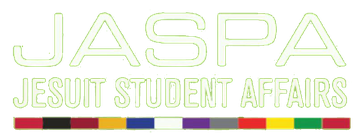A Just and Sustainable Future: Our Shared Responsibility
The Program Committee is pleased to open our call for program proposals for our 2020 JASPA Five Year Summer Institute. Held at Loyola University Chicago, July 20-24, the Institute’s theme is “A Just and Sustainable Future: Our Shared Responsibility”. JASPA promotes the professional development, formation and collaboration of student affairs administrators working in Jesuit, Catholic higher education through a robust offering of programs and online enrichment. The Institute calls us to center ourselves professionally as we engage, reflect and form plans to sustain our mission in the years to come.
One pathway to Our Just and Sustainable Future can be experienced through the newly released strategic vision from our partners in the Society of Jesus. The 2019-2029 Universal Apostolic Preferences (AUP) for the Jesuits worldwide are as follows:
- To show the way to God through the Spiritual Exercises and discernment;
- To walk with the poor, the outcasts of the world, those whose dignity has been violated, in a mission of reconciliation and justice;
- To accompany young people in the creation of a hope-filled future;
- To collaborate in the care of our Common Home.
We wish to utilize our Five Year Summer Institute to engage with these preferences and learn how these preferences may complement the work we do within JASPA and throughout our campus communities.
Those who are able to join us in Chicago and participate in the Institute will:
- Engage in exploration and conversation regarding the nexus of Jesuit, Catholic mission and contemporary student affairs issues, in light of the theme “A Just and Sustainable Future: Our Shared Responsibility.”
- Promote and facilitate the exchange of best practices, programs, activities, services, and research among student affairs professionals in Jesuit colleges and universities, in light of the theme “A Just and Sustainable Future: Our Shared Responsibility.”
- Network and build relationships with emerging professionals, and professionals, including those with similar levels of experience, interests, and functional areas.
Therefore, we invite colleagues from across our Ignatian network to propose learning opportunities that advance the above learning outcomes in creative and innovative ways.
As student affairs professionals, we are placed in different areas to give attention to those great and abiding questions of who we are and what we want our students to become. We must pay special care as to how we promote a just and sustainable future through our Catholic and Jesuit characters. When creating a program proposal, we encourage you to reflect on the questions posed below.
(A) Discerning and Sustaining Our Jesuit Mission
- How does the Jesuit mission compel us to have a shared responsibility in a just and sustainable future?
- How do we incorporate reflection and discernment into our personal lives and professional work?
- How do we collaborate with our students and colleagues to address creative tensions in secular society while renewing our commitment to the Jesuit mission in social, economic, cultural and political spheres?
- What programs and initiatives bring the spiritual exercises to life for our campus communities?
(B) Reconciliation and Justice: Walking with the Excluded
- How do we welcome and nurture the most excluded and vulnerable persons on our campuses?
- How do we reconcile previous injustices with future planning priorities?
- What programs, policies and initiatives help us to seek the Common Good and impart good civic formation?
(C) Accompanying Others in the Creation of a Hope Filled Future
- How can we “do business differently” to become more inclusive and innovative campus communities?
- How do we help students and colleagues experience their most authentic selves?
- How does the Jesuit difference allow us to uniquely accompany students and colleagues to help their personal, academic and vocational discernment?
(D) Collaborate in the Care of Our Common Home
- How do we construct alternative ways of being (programs, services, initiatives) that promote sustainable development of campus, local, and global communities?
- How do we assess our progress, share responsibility and hold each other accountable for justice and sustainability efforts?
Descriptions of the Different Conference Session Types:
Workshop (100 minutes)
Workshops are extended professional development opportunities. Workshops should include a brief overview of the central issues/context for the workshop. Presenters then guide participants through engaged discussion, opportunities for reflection, and/or hands-on, collaborative activities. The goal is for participants to leave with knowledge or skills that can be readily applied to their campus communities.
Educational Session (50 minutes)
Educational sessions balance conceptual and theoretical frameworks with concrete, pragmatic examples, preferably from more than one program or institution (although not required). These sessions should be designed to complement the theme, A Just and Sustainable Future: Our Shared Responsibility, and at least one of the four Universal Apostolic Preferences.
Lightning Round Presentation (5 minutes)
Lightning Round talks are brief, five minute presentations which require the speaker to make their point clearly and rid the presentation of non-critical information. The goal of lightning talks is to articulate a topic in a quick, insightful, and clear manner (a great professional skill to have in a higher education setting). These concise and efficient talks are intended to grab the attention of the audience, convey key information, and allow for several presenters to share their ideas in a brief period of time. Lightning round presenters will be grouped by themes and talks will be followed by participant discussion.
Click here to submit a Call for Proposal form
Timeline
- Call for Proposals opens: August 13, 2019
- Call for Proposals closes: October 4, 2019, 11:59pm (PST)
- Applicants notified of selection status: November 2019
Questions?
Contact the Institute Content Chairs at:
Michele Bogard, MicheleBogard@creighton.edu
Michael Puma, mpuma@loyola.edu
Ophelie Rowe-Allen, orallen@fairfield.edu
